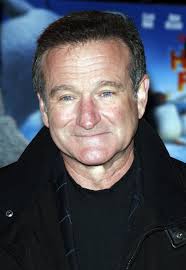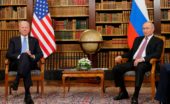Re Ian Bremmer 'Could third-party candidates upend the 2024 US election?' 3 April The current political movement in the USA…
Wednesday Night #1693
Written by Diana Thebaud Nicholson // August 12, 2014 // Wednesday Nights // Comments Off on Wednesday Night #1693
 From a Who’s Who of celebrities to millions of ‘ordinary’ people, it seems the whole world is in mourning for Robin Williams, an extraordinary talent who had the power to make us laugh (17 Times That Robin Williams Made Us Laugh Very, Very Hard) and cry (Awakenings”) and think (“Dead Poets Society”). He gave us so much and all the while struggled with the insidious and cruel afflictions of depression and addiction. His death has generated an explosion of frank discussion of depression on social media, certainly helpful to those of us who have no profound understanding of it, and, it is to be hoped, supportive and consoling for the many who are discovering fellow sufferers.
From a Who’s Who of celebrities to millions of ‘ordinary’ people, it seems the whole world is in mourning for Robin Williams, an extraordinary talent who had the power to make us laugh (17 Times That Robin Williams Made Us Laugh Very, Very Hard) and cry (Awakenings”) and think (“Dead Poets Society”). He gave us so much and all the while struggled with the insidious and cruel afflictions of depression and addiction. His death has generated an explosion of frank discussion of depression on social media, certainly helpful to those of us who have no profound understanding of it, and, it is to be hoped, supportive and consoling for the many who are discovering fellow sufferers.
“Robin Williams was an airman, a doctor, a genie, a nanny, a president, a professor, a bangarang Peter Pan, and everything in between. But he was one of a kind. He arrived in our lives as an alien – but he ended up touching every element of the human spirit. He made us laugh. He made us cry. He gave his immeasurable talent freely and generously to those who needed it most – from our troops stationed abroad to the marginalized on our own streets.” — President Barack Obama.
The election of Turkey’s President Erdoğan is being greeted with cautious approval, however there are concerns.
As the BBC story points out Mr Erdogan has already made it clear that now that he is to be president, he wants to secure more power for the presidency, but his opponents fear – with undoubtedly some justification – increasingly authoritarian rule, giving much credence to this analysis in Project Syndicate.
Jan-Werner Mueller: Erdoğan and the Paradox of Populism
Contrary to much conventional wisdom, populism is not defined by a particular electoral constituency – such as the lower middle class – or by simplistic policies pandering to the masses, as liberal observers often argue. Rather, populism is a thoroughly moralized conception of politics, and a populist is a politician who claims that he or she – and only he or she – truly represents the people, thus relegating all political opponents to the role of iniquitous pretenders. … In the eyes of the populist, there cannot be anything like a legitimate opposition. Whoever is against the leader is automatically against the people. And, according to this logic, whoever is against the people cannot truly belong to the people. … Populists, then, are not only anti-elitist; they are necessarily anti-pluralist and hence anti-liberal. Their politics is always polarizing, splitting the actual citizenry into a pure, moral people and the immoral others.
Stratfor’s Robert D. Kaplan offers a geopolitical analysis in the reprinted (from May 2013) Turkey’s Geographical Ambition
Erdogan knows that Turkey must become a substantial power in the Near East in order to give him leverage in Europe. Erdogan’s problem is that Turkey’s geography between East and West contains as many vulnerabilities as it does benefits. This makes Erdogan at times overreach. But there is a historical and geographical logic to his excesses.
Prime Minister, Nouri al-Maliki, appears to have finally lost his job, after Iraq‘s president appointed a rival Shia candidate to form a new government in a bid to end the deadlock that has paralysed the Baghdad government. However, the transition is already proving far from easy. AlJazeera reports that Maliki stands defiant as Iraq crisis deepens —
Incumbent PM refuses to step down saying nomination of Haider al-Ibadi is violation of Iraq’s constitution. Definitely not a happy camper. And isn’t it wonderful how the least democratic leaders seem to be the ones who always invoke the constitution?
In the chapter on Politics making for strange bedfellows the latest entry is Iran puts support behind Maliki’s successor as Iraqi prime minister — Move aligns Tehran with US, Saudi Arabia and Nato in formally backing Haider al-Abadi as new premier.
FT comments that Abadi [is] seen as steady if uninspiring leader and that the Manchester-educated prime minister-designate is thought to be more a conveyor of other powerful men’sideas rather than as an original thinker.
London’s Mayor Boris Johnson has published a forthright plea for support of the Kurds (We cannot abandon the Kurds) that is both well argued and a delightful read.
(Daily Telegraph via National Post) In the last few years the links between Britain and Kurdistan have been developing fast, with the first ministerial delegation from London arriving there two years ago. Standard Chartered Bank has established there, as well as many other firms. They are going not simply because Kurdistan has theoretically the sixth largest oil deposits in the world, but because the place is an oasis of stability and tolerance. They have a democratic system; they are pushing forward with women’s rights; they insist on complete mutual respect of all religions. It would be an utter tragedy if we did not do everything in our power to give succor and relief to those who are now facing massacre and persecution, and to help repel the maniacs from one of the few bright spots in the Middle East.
We leave aside – for now – the volatile Israel/Palestine/Gaza situation as whatever we publish today will, no doubt, be rendered inoperative by tomorrow.
Ion Valaskakis highly recommends A Crisis a Century in the Making
And the Ukraine pot keeps bubbling, as Russia sends an aid convoy to eastern Ukraine despite Western warnings of ‘invasion pretext’ at a time when Kiev’s forces seem to be prevailing.The reported presence of some 45,000 Russian troops massed along the border gives more than a little credence to the concerns of the West.
Writing in Embassy Magazine (For MH17 victims, justice may never come), David Jones throws cold water on any hope that those responsible for shooting down MH17 will be brought before the ICC – or any other tribunal.
Anyone attempting to promote the possibility of justice is insulting the intelligence of readers. It simply will not happen.
Christopher Granville: Neutralizing Ukraine
… when it comes to the escalating conflict in eastern Ukraine, the relevant external powers – that is, the US, the European Union, and Russia – are not only failing to achieve a cease-fire; they are refusing to pursue a solution that… is there for the taking. All that is needed is to introduce into the Ukrainian constitution a provision that significantly impedes membership in any military alliance, whether NATO or the Russia-dominated Collective Security Treaty Organization of the Commonwealth of Independent States. For example, the decision to join such an alliance – or even to implement an agreement that allows a foreign country to base its troops on Ukrainian soil – could require the approval of a qualified majority of, say, two-thirds of voters or regional legislature.
The Financial Times notes that the EU plans sanctions talks with Latin America — Brussels is to hold negotiations with countries such as Brazil and Chile to try to dissuade them from replacing banned European exports to Russia.
Ebola has now claimed its 1,000th victim, WHO has approved has approved the use of untested ZMapp to treat the current outbreak and the U.S. is sending a shipment to Liberia. The debate about the ethics of using untested drugs is intense and we highly recommend the baanced views aired on Tuesday’s The Current Are drugs the best way to curb the Ebola outbreak? [Note there is Canadian content to this story: not only is ZMapp being developed as a result of the collaboration between Mapp Biopharmaceutical (San Diego), LeafBio, Defyrus Inc. (Toronto), the U.S. government and the Public Health Agency of Canada [More on Wikipedia] , but TKM-Ebola, produced by B.C.-based Tekmira Pharmaceuticals has now been fast-tracked by U.S. regulators.
Hope all are watching the developments in the Mount Polley Mine tailings pond breach. The BC government is likely going to bear a huge political cost, despite BC Mines Minister Bill Bennet’s upbeat pronouncement that Mount Polley dam breach not an environmental disaster. Contrast with Federal Industry Minister James Moore [the Conservatives’ minister for B.C.] who, describes the tailings pond breach as “terrible” and says it underscores the need for effective regulation and monitoring.
You should also be following the CRA vs. Canadian charities contest. We agree fully with the Toronto Star editorial position that the government should agree to meeting with charities to explain its targeting of high profile environmental, aid and free speech charities. And, if it can, explain why the CRA audits should not be construed as political attacks on groups that disagree with the Harper government.
Mireille Silcoff‘s book, Chez l’arabe is off to a great start with a very long Gazette feature story on her Author Mireille Silcoff’s energy crisis — Mysterious illness forced author of Chez l’arabe off the fast track. But by remaining still out of necessity, she gradually found a new voice. The book sounds delightful and we look forward to the launch presented by House of Anansi and Librairie Drawn & Quarterly on Sept. 9 at 8 p.m. at the Emerald, 5295 Parc Ave. Note it for your calendar.
Dr. Charles (Chuck) Cogan’s blog on HuffPost When One Human Being Is Weighed Less Against Another



